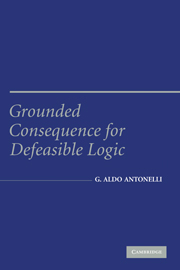Foreword
Published online by Cambridge University Press: 18 July 2009
Summary
Logic is an ancient discipline that, ever since its inception some 2,500 years ago, has been concerned with the analysis of patterns of valid reasoning. The beginnings of such a study can be traced back to Aristotle, who first developed the theory of the syllogism (an argument form involving predicates and quantifiers). The field was further developed by the Stoics, who singled out valid patterns of propositional argumentation (involving sentential connectives), and indeed flourished in ancient times and during the Middle Ages, when logic was regarded, together with grammar and rhetoric (the other two disciplines of the trivium), as the foundation of humanistic education. However, the modern conception of logic is only approximately 150 years old, having been initiated in England and Germany in the latter part of the nineteenth century with the work of George Boole (An Investigation of the Laws of Thought, 1854), Gottlob Frege (Begriffsschrift, 1879), and Richard Dedekind (Was sind und was sollen die Zahlen?, 1888). Thus modern symbolic logic is a relatively young discipline, at least compared with other formal or natural sciences that have a long tradition.
Throughout its long history, logic has always had a prescriptive as well as a descriptive component. As a descriptive discipline, logic aims to capture the arguments accepted as valid in everyday linguistic practice.
- Type
- Chapter
- Information
- Grounded Consequence for Defeasible Logic , pp. ix - xiiPublisher: Cambridge University PressPrint publication year: 2005



